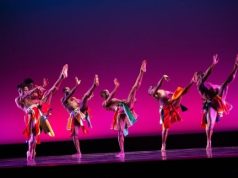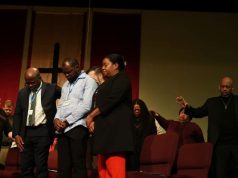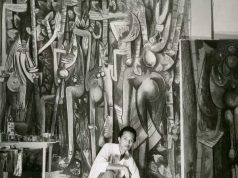

Clara Maria Apostolatos (Hyperallergic) explores Coco Fusco’s first United States retrospective, Tomorrow I Will Become an Island at El Museo del Barrio, New York, New York. [Also see our previous post Coco Fusco: “Tomorrow…] Apostolatos writes, “In her first US retrospective, she becomes museum specimen, interrogator, colonial queen, and more to expose the systems that produce them.” Read this excellent review at Hyperallergic.
Few artists have examined the ethnographic gaze as closely — or turned it as deftly back on itself — as Coco Fusco. Across her career, she has inhabited a succession of roles — museum specimen, interrogator, colonial queen, subaltern laborer — to expose the systems that produce them. Her works, whether filmed, staged, or photographed, return to that charged encounter so that what began as performances about being looked at has evolved into frameworks for looking back: at surveillance, at the museum’s apparatus of display, at the camera’s complicity, at the viewer’s own position within it. Fusco’s first United States retrospective, Tomorrow I Will Become an Island at El Museo del Barrio, traces this evolving choreography of perception.
The show is divided into four loosely thematic sections titled “Migration,” “Cultural Encounter,” “Interrogation,” and “Poetry and Power.” In “Els Segadors” (2023), part of the first section, a diverse grouping of Catalans recites the centuries-old anthem of independence — banned during Francisco Franco’s dictatorship in the mid-20th century and later revived as a symbol of sovereignty — reflecting on what the song now means to them. Filmed in a single, frontal frame and intercut with candid exchanges between Fusco and her participants, the work lets the performance slowly fray: pride gives way to hesitation, patriotism to unease, until talk of belonging turns to acknowledgements of exclusion. Voices slip between Catalan and Spanish, color alternates with grayscale, and the anthem mutates through salsa, folk, and rap. Each shift introduces a hybridity that unsettles a fixed sense of Catalan identity; each slippage loosens the seams of the nationalist script it supposedly restages. [. . .]
“Els Segadors” unfolds from a script that gradually breaks open, a form that applies to much of her work, including her photographs. Rounding out the same gallery, for instance, is a continuous band of black and white portraits depicting immigrants, friends, and strangers alike, posed against urban and domestic backdrops. Taken over the past year — a period shadowed by immigration raids — “Everyone Who Lives Here Is a New Yorker” (2025) initially reads as a set of informal yet intimate portraits. Only when we cross the room to encounter Augustus Frederick Sherman and Lewis Hine’s early-20th-century photographs of immigrants, hung in a grid, does it become clear that Fusco has staged her sitters to mirror the archival compositions. [. . .]
Fusco’s performances often borrow from institutional procedures: She recreates military drills in “A Room of One’s Own: Women and Power in the New America” (2006–08) and enrolls in an immersive simulation and workshop on military interrogation in “Operation Atropos” (2006), dissecting the grammar of disciplinary systems. Her videos carry the same investigative and elegiac impulse. Works such as “La confesión” and “La Plaza vacía” (both 2012) consider Cuban national memory, splicing found footage, oral histories, historical documents, partial testimonies, and Fusco’s measured voice-over to trace the afterlives of the Cuban revolution. [. . .]
One of the concluding works, “Your Eyes Will Be an Empty Word”(2021), offers something like an answer. In it, Fusco rows around Hart Island — the largest mass grave in the United States, where formerly enslaved and unhoused people and victims of epidemics such as COVID-19 and HIV/AIDS are buried — reciting a verse by Cuban poet Dulce María Loynaz about isolation and endurance. The camera drifts steadily, oars cutting through deep blue water, while violins draw out mournful, long-held notes. The allegorical image clarifies Fusco’s political stance as well as circles back to the exhibition’s title. To “become an island” is to maintain autonomy within systems that consume difference, to stay apart without retreating. Across three decades, Fusco has traced what happens when ideology isolates, when nations and individuals retreat behind physical and political borders. Yet the exhibition suggests that to “become an island” may also be to claim autonomy, to inhabit the structures of power without surrendering to them.
For full article, see https://hyperallergic.com/1055584/coco-fusco-turns-back-the-ethnographic-gaze-el-museo-del-barrio/D111025
[Photo above (courtesy of the artist and Mendes Wood DM): Coco Fusco, “A Room of One’s Own: Women and Power in the New America” (2006–8), performance documentation.]
Clara Maria Apostolatos (Hyperallergic) explores Coco Fusco’s first United States retrospective, Tomorrow I Will Become an Island at El Museo del Barrio, New York, New York. [Also see our previous post Coco Fusco: “Tomorrow…] Apostolatos writes, “In her first US retrospective, she becomes museum specimen, interrogator, colonial queen, and more to expose the systems that produce them.”




